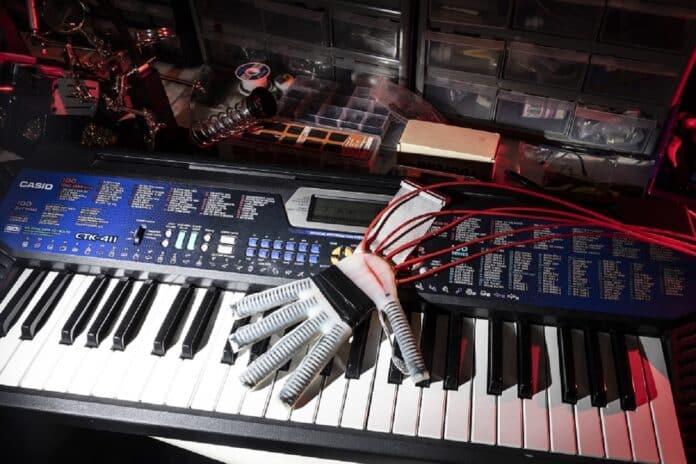Stroke, a leading cause of long-term disability worldwide, often leads to poor fine motor skills and dexterity. Among the activities affected by stroke, playing the piano can be particularly challenging due to its intricate finger movements and coordination requirements. In recent years, advancements in robotics and neurorehabilitation have paved the way for innovative solutions to aid stroke survivors in their recovery journey.
This study explores using a robotic glove designed to assist individuals in relearning piano-playing skills after a stroke. The robotic glove aims to enhance motor recovery, promote neural plasticity, and improve stroke survivors’ overall quality of life by providing targeted support and feedback. This paper presents an overview of the development and potential benefits of this novel robotic glove in the context of stroke rehabilitation and its implications for future research and clinical applications.
Individuals who have experienced neurotrauma, like stroke, face significant challenges in everyday tasks due to reduced coordination and strength in their upper limbs. Researchers have been working on developing robotic devices to assist in improving their abilities. However, traditional rigid robotic devices have limitations, especially for complex tasks such as playing a musical instrument.
In a groundbreaking development, a team from Florida Atlantic University has created a unique robotic glove that utilizes artificial intelligence to enhance hand dexterity. This soft robotic hand exoskeleton incorporates flexible tactile sensors, soft actuators, and AI capabilities, making it the first to differentiate between correct and incorrect renditions of a musical piece. Combining these features in a single-hand exoskeleton opens up new possibilities for stroke rehabilitation and relearning piano skills.
Erik Engeberg, Ph.D., senior author, a professor in FAU’s Department of Ocean and Mechanical Engineering within the College of Engineering and Computer Science, and a member of the FAU Center for Complex Systems and Brain Sciences and the FAU Stiles-Nicholson Brain Institute said, “Playing the piano requires complex and highly skilled movements, and relearning tasks involves the restoration and retraining of specific movements or skills. Our robotic glove comprises soft, flexible materials and sensors that give individuals gentle support and assistance to relearn and regain their motor abilities.”
Researchers have successfully integrated specialized sensor arrays into each fingertip of a robotic glove, enabling precise force and guidance for recovering fine finger movements necessary for piano playing. The robotic glove provides real-time feedback and adjustments by monitoring users’ movements, making it easier for them to grasp the correct techniques.
In a demonstration, the researchers programmed the glove to differentiate between correct and incorrect renditions of the famous melody “Mary Had a Little Lamb” on the piano. Using data from the glove’s tactile sensors, algorithms such as Random Forest, K-Nearest Neighbor, and Artificial Neural Network were trained to classify song variations. The accuracy of these algorithms was evaluated in classifying correct and incorrect versions of the song, both when the glove was used independently and when worn by a human subject.
The Frontiers in Robotics and AI study showed that the Artificial Neural Network (ANN) algorithm achieved high classification accuracy (97.13% with a human subject, 94.60% without) in identifying errors and out-of-time key presses in playing a song. This highlights the potential of the intelligent robotic glove in assisting individuals with disabilities to relearn complex tasks like playing musical instruments.
The glove, developed using 3D printed polyvinyl acid stents and hydrogel casting, integrates five actuators into a wearable device, customizable to an individual patient’s anatomy. The design simplicity allows for practical use, and the approach can be applied to personalized rehabilitation programs for various daily tasks. Clinicians can use the data to identify weaknesses and create personalized action plans, prescribing progressively challenging songs to facilitate improvement in motor functions.
“The technology developed by Professor Engeberg and the research team is a game-changer for individuals with neuromuscular disorders and reduced limb functionality,” stated Dr. Stella Batalama, Dean of the FAU College of Engineering and Computer Science. She further highlighted that their robotic glove is the only one to demonstrate the capability of “feeling” the difference between correct and incorrect versions of the same song.
The study’s co-authors include researchers from FAU, Boise State University, and the University of Florida. The research received support from the National Institute of Biomedical Imaging and Bioengineering, the National Institute of Aging, and the National Science Foundation, as well as seed grants from the FAU College of Engineering and Computer Science and the FAU Institute for Sensing and Embedded Network Systems Engineering (I-SENSE).
The intelligent hand exoskeleton developed by the research team represents a significant advancement in assisting individuals with neuromuscular disorders and reduced limb functionality in relearning dexterous tasks like playing musical instruments. The combination of artificial intelligence, tactile sensors, and real-time feedback allows the glove to provide accurate assistance, identify errors, and offer customized rehabilitation programs. This innovative technology holds promise for music therapy and various daily tasks, providing individuals with disabilities the opportunity to regain independence and improve their quality of life.
Journal Reference:
- Maohua Lin, Maohua Lin et al. Feeling the beat: A smart hand exoskeleton for learning to play musical instruments. Frontiers in Robotics and AI. DOI:10.3389/frobt.2023.1212768
